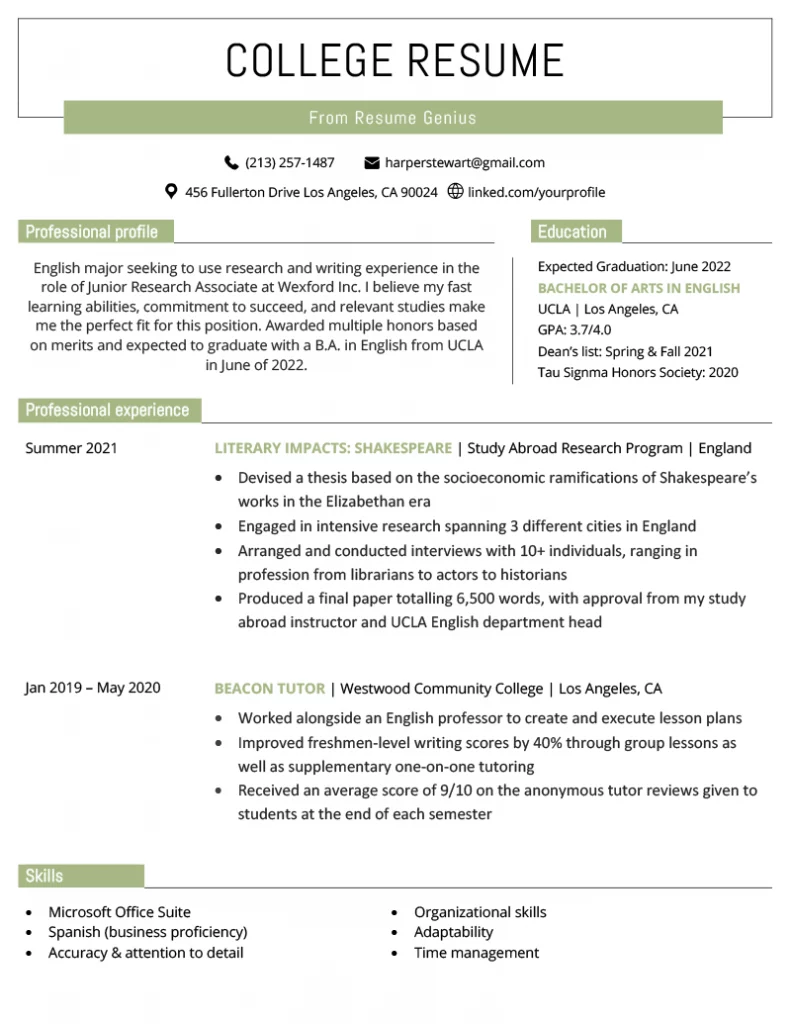Compiling a resume is a tricky thing to do for college students. They’ve seen people submit their resumes before, and they know that what gets listed first is the work experience. And that’s what they don’t have yet, so what else should be on the resume of a college student?
We have gathered some of the top resume tips for you to read and see how to create a top-notch content that will impress your potential employer. After all, your resume will be the first contact that your employer will have with you. So you might as well invest in it!
How to Make a Good Resume for College Students
Without further ado, let us introduce you to some great tips that will help you make a top-notch resume.
1. Highlight the indented position
Your employer must know you are aware of the position you’re applying for. Most people focus on bragging their achievements so much that they forget to mention how they would add their own values to the vacancy that is announced. So read all the details regarding the job you’re applying for, do some research on how that job is perceived in the labor market, and connect the data with what you put down in the resume.
2. Specify your Education
Whether that be a major or minor. You should highlight the education you have pursued, putting down the coursework that relates to the job you’re applying for, and other relevant educational experiences that you have. Make sure you double-check the eligibility, and to see if the job you’re applying for corresponds to your degree. Although, in some cases, there might be exceptions.
3. Elaborate on your experience
Leadership skills, critical thinking, and problem-solving skills do not appear all of a sudden once you start working strictly from 9-5. They emerge slowly as you experience different stages of your life that help you build up your professional strengths. And through your resume, you can choose to mention internships, community work, or volunteer work that has shaped your mindset of today.
Employers love creative people who can make the best out of every experience, so you have one shot to wow them with how you connect your life lessons with future goals. Do not be humble, and use the opportunity.
4. List your achievements
If you won a creative writing contest on your first year of college, or you lead a whole winning team through a project management task – make sure to bring that up in your resume. Your achievements will show your recruiters the areas on which you’re best at, and will make them want to get to know you personally. Surely, you will be asked to elaborate on them during the interview, so you choose wisely the recognitions you are going to list.
5. List down your special skills
Everything that makes you stand out from the masses is worth noting here. Whether you speak multiple languages, know how to use several computer programs, or have a way with words during public speaking. Let all of this information sink in your resume, as it will pay off for the next stages of your recruitment process.
6. Double-check your writing
People’s professionalism often gets judged on the way they write and present their written pieces to a specific audience. Bear in mind that your resume will be revised carefully by people whose only job is to actually go through resumes and choose a proper candidate. So make sure to spell check everything more than twice, use appropriate grammar, and especially proper capitalization.
7. Put your judgment to use
Try looking at your resume from a neutral perspective. Consider you are an HR representative in the company that you are applying to. Ask yourself questions like: Is this resume outstanding? Does it awaken my curiosity to meet this person? Would you hire you? Try updating your CV until the point where you have answered yes to all of these questions.
8. Have someone read it
Although trying to read your resume from a neutral perspective is recommended, having someone give you a third or fourth opinion is also very convenient. You should not fear criticism, specifically constructive one, as people try to let you know where you need to add up or reduce irrelevant information about yourself.
9. Transmit self-confidence
Do not underestimate people’s ability to read between the lines. Make sure to choose your articulation very carefully by letting your employer know that you’ve got the leadership skills, passion, and commitment to own the work. That is why experts in this field suggest that you use expressions such as I firmly believe, I am convinced, etc.that give away your level of self-sufficiency and confidence.
How to List Skills to Resume
Knowing what skills to add to your resume and how to list them is actually a skill itself — it can make or break your resume. The first thing you want to consider is the aesthetic part of your resume. You can either list the skills in a separate section of the paper or integrate them into your job experience section. Whichever option you decide to go by, the next step is to carefully select the skills you want to add. Do not add skills just for the sake of adding them. Moreover, avoid at all costs listing skills that are not relevant to the requirements of the job you are applying for. While you might be tempted to list every skill, focus only on the most important ones, and leave space to discuss the ones not mentioned during the job interview.
Interested in pursuing a degree?
Fill out the form and get all admission information you need regarding your chosen program.
This will only take a moment.
Message Received!
Thank you for reaching out to us. We will review your message and get right back to you within 24 hours.
If there is an urgent matter and you need to speak to someone immediately you can call at the following phone number:
- We value your privacy.
Highlight only the relevant hard skills that qualify you for the job. These include the educational background and experience, so do not include anything that does not fit the job description.
Soft skills, also known as transferable skills, are also essential to list on your resume. These are universal skills that can be applied to any profession and the skills that employers look for in new candidates. Transferable skills include critical thinking, multitasking, technology proficiency, teamwork, and communication skills.
According to the National Association of Colleges and Employers (NACE), the most valued skills hiring managers look for are problem-solving and effective teamwork, followed by written communication skills, leadership skills, strong work ethic, analytical skills, initiative, detail-oriented, and technical skills.
In order to know exactly what skills to add to your resume, carefully research the company and read the job description.
College Student Resume Template
The following is a template that includes all the essential information you should include in your resume.

These are our top 9 resume writing tips all wrapped up for your next job application.
Whereas for any relevant information that the University of the Potomac can help you with, please contact us.











